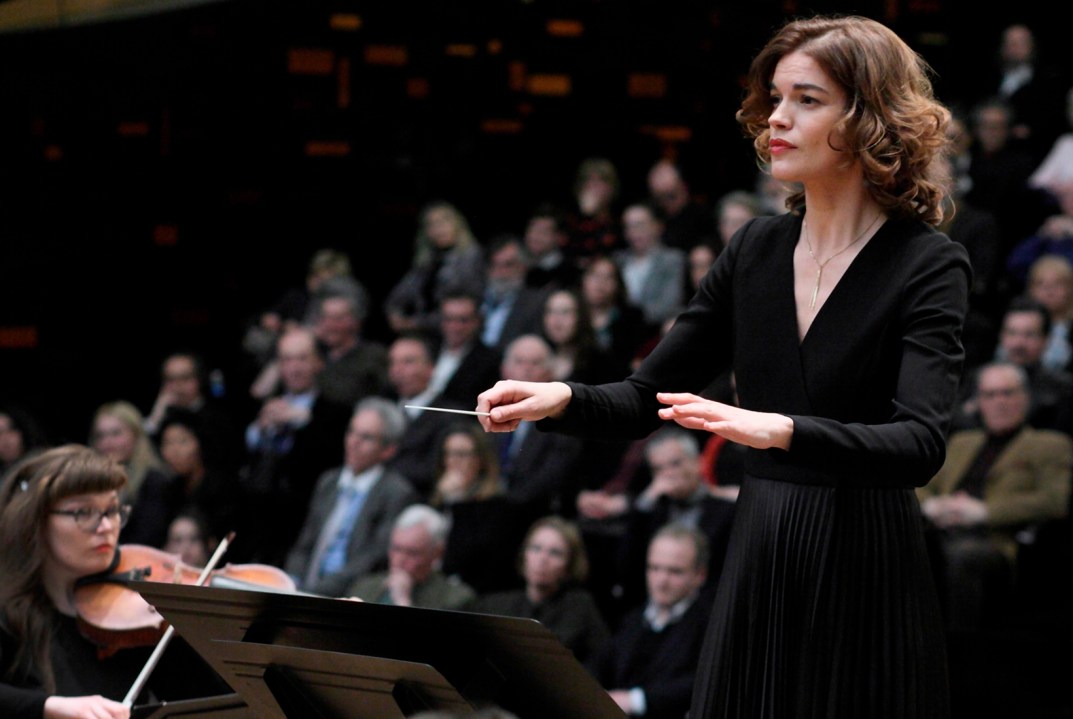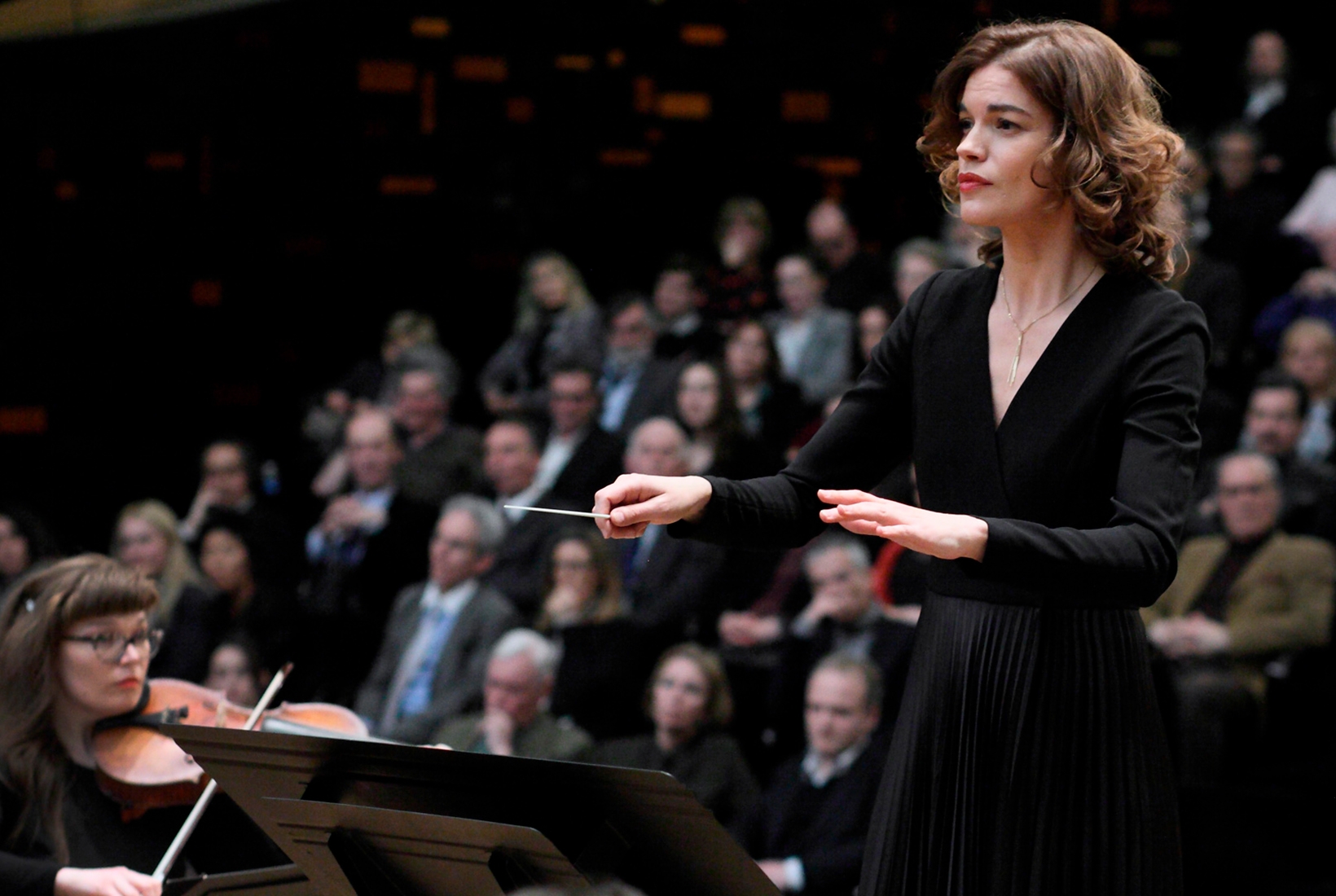On the face of it, a French-language drama about a Parisian symphony orchestra mightn’t sound like the most action-packed of TV watches. In fact, though, Philharmonia (Sundays) is pretty much Dallas with violins.
The first episode began with the eponymous orchestra blasting out a spot of what Shazam assured me was Dvorak, before its elderly conductor dropped his baton and collapsed to the floor, never to rise again. Cue a pair of Gallically elegant female lower legs making their way through the airport as one Hélène Barizet arrived from New York to take over the role.
David was left in a tartan bag in Belfast; Helen was discovered in a tartan bag in a Dundalk phone box
Not that her appointment was universally welcomed. Several middle-aged male musicians shook their heads and made the kind of impeccably sexist remarks more usually associated with old-school British coppers of the 1970s. The orchestra’s director, Léopold Saint-Just, told colleagues that Hélène had been foisted on him by the culture ministry as a feminist gimmick, and gave it a week before the pressure got to her and she realised that conducting isn’t for girls. But of course Hélène soon proved him wrong, combining stiletto-heeled toughness with overwhelming musical competence (‘Try to play the quaver in bar 448 less staccato’).
At this stage, then, it looked as if we were in for yet another drama about how women are great and men are rubbish — something we can definitely get at home. Luckily, the longer Sunday’s episode went on, the clearer it became that Philharmonia is a lot more interesting than that. One of the most ferociously anti-Hélène musicians is now Agathe, a suitably brassy horn player, whose views may well be influenced by the affair she’d been enjoying with Hélène’s husband while Hélène was in New York. Agathe’s also determined to keep fighting for her man, despite his rekindled uxoriousness, and the fact that he’s just responded to her declaration of continuing love with a less than encouraging ‘merde’.
More significantly, Hélène might not be all she seems. We’ve already had some hints that just because M. Saint-Just is paranoid doesn’t mean that she isn’t out to sabotage his orchestra. There’s also that gun she keeps in her drawer, which might soon explain why Philharmonia is billed as a thriller. And, while she’s yet to go the full Villanelle, a scene where she went to a hospital to visit her violently insane mother (whose condition she has a 50-50 chance of inheriting) ended with her calmly observing her old mum cough herself to death rather than, say, calling for medical help. In short, I would suggest, this is a woman who should certainly be watched — in more ways than one.
Any novelists in need of inspiration might want to take a look at Long Lost Family Special: Born without Trace (Monday and Tuesday), presented by Davina McCall and Nicky Campbell. Both instalments brought us remarkable stories of foundlings searching for their origins and generally finding them, but with plenty of gaps left for viewers’ imaginations to try and fill in.
On Monday, we were introduced to David, who’d been left in a tartan bag outside a house in Belfast in 1962, and Helen who was discovered in a tartan bag in a Dundalk phone box in 1968. As Davina moved into empathy overdrive and Nicky radiated solemnity, the programme’s crack DNA team got down to business — although without ever quite explaining how. As an astonishing result, it discovered that David and Helen were full siblings, the children of a married Dublin bandleader and a single woman (both now dead) who was 34 and 40 when she gave birth to them during the course of a 30-year relationship. David and Helen grew up in loving adopted homes, without knowing until later in life that they’d been foundlings — and in what felt like some sort of significant comment on the arbitrariness of sectarianism, he was brought up Protestant and she Catholic. Which, needless to say, didn’t bother either of them when on Monday’s programme they learned of each other’s existences for the first time, met, embraced and instantly felt like family.
There were further eye-popping stories on Tuesday, including that of Simon, left outside a Kent pub in 1963, who turned out to have been the seventh child of a happily married couple (both now dead) who brought up their first six in a house close by. Yet, while their stories were very different, the reactions of the foundlings were strikingly similar — and somehow even more affecting for not necessarily being strictly rational. All took the fact they’d been found wrapped up as proof of how much their birth mothers loved them. All decided that those mothers must have had no choice but to abandon them. All concluded that meeting a sibling meant they knew who they were for the first time.







Comments